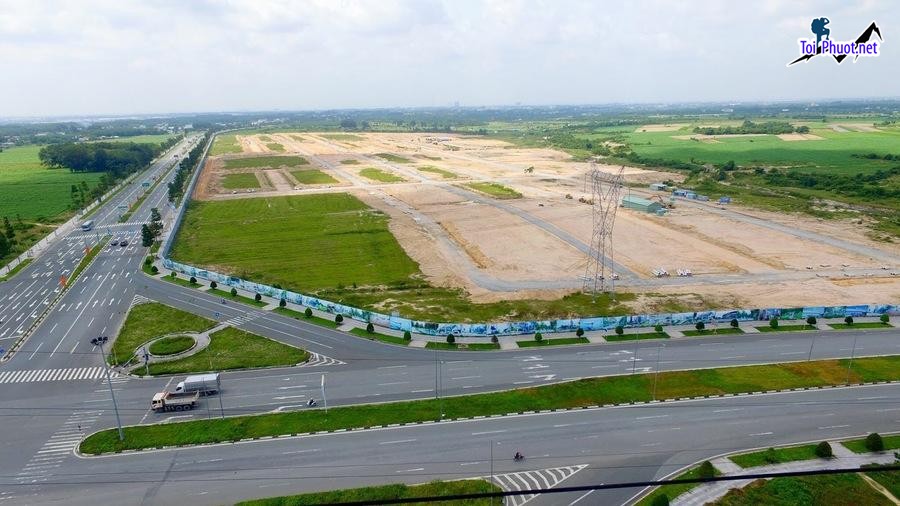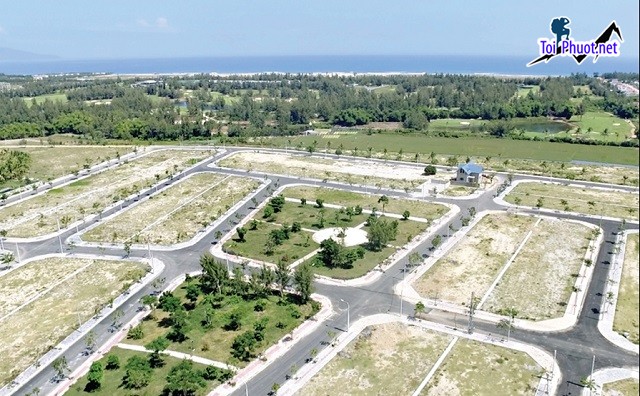
Project land, or đất nền dự án in Vietnamese, refers to plots of land located within a planned real estate project that is under development by an approved investor. These lands have not yet been developed or built upon and remain in the early stages of project implementation.
Project land refers to land plots situated within an officially approved and clearly zoned real estate development. These plots typically lie in areas with good access to public infrastructure and amenities, such as roads, schools, and utilities. The primary purpose of this type of land is for residential, ecological, or commercial use.
The project developer is responsible for completing compensation procedures, acquiring the necessary permits, and ensuring all legal documents are in place before transferring or selling the land.
Project land and procedures for buying and selling project land you need to know in the US
According to Articles 55 and 56 of the 2014 Law on Real Estate Business, the following conditions must be met before project land or properties formed in the future can be sold:
Article 55 – Conditions for Sale of Future-Formed Real Estate:
The project must have:
Land allocation or land lease decision
Land use rights certificate
Investment policy approval
Approved 1/500-scale master plan
Construction permit (if required)
Confirmation of project eligibility for sale
Developer's business registration
For technical infrastructure: A written inspection confirming that the required infrastructure has been completed according to schedule. For high-rise buildings, the foundation must be completed and inspected.
Before selling or leasing housing formed in the future, the developer must notify the provincial housing authority for approval. Within 15 days, the authority must confirm whether the property meets eligibility requirements or provide justification if it does not.
Article 56 – Bank Guarantee Requirement:
The developer must obtain a financial guarantee from a qualified commercial bank to ensure compensation if the developer fails to deliver the property on time.

According to Decree 43/2014/ND-CP, amended by Decree 148/2020/ND-CP, the following conditions apply:
The developer must complete technical and social infrastructure based on the approved 1/500 master plan, including connections to regional infrastructure and access to essential services like electricity, water, drainage, and waste collection.
The developer must fulfill all financial obligations, including land use fees, lease fees, taxes, and other fees.
The project must be located in an area where subdivision and sale of land plots (phân lô bán nền) is legally permitted.
The land must not be located in highly regulated zones, such as central districts of special-class cities, architecturally significant urban areas, or along major urban roads and landmarks.
If all conditions are met, the developer is legally allowed to transfer land use rights for individual plots within the project.
Project land and procedures for buying and selling project land you need to know in the US
Article 72 of Decree 43/2014 outlines the procedures for transferring land use rights:
The developer must submit one complete set of documents to register land use rights and property ownership certificates on behalf of the buyer or provide the buyer with the documents necessary to register independently.
Required documents include:
Land and asset registration application form
Sales or transfer contract (in accordance with the law)
Handover record of land, housing, or construction works
Choose a reputable developer:
Opt for developers with strong financial backing, a clean track record, and experience in completing similar projects. Investigate how they’ve resolved past disputes.
Ensure legal clarity:
Request all legal documents including:
Location and zoning approval
Approved 1/500 master plan
Future construction plans
Verify the developer’s right to subdivide and sell land by reviewing:
Written permission from the Department of Construction
Land allocation/lease decisions
Proof of fulfilled financial obligations
Construction permit (if required)
Review the purchase contract carefully:
The sales agreement should detail:
Payment method and schedule
Land handover deadlines
Penalty clauses for delays or contract violations
Ensure the contract is notarized as required by law.
Assess financial readiness:
Use your own capital as much as possible. If taking a bank loan, limit it to no more than 50% of the land’s value. For joint purchases with friends or family, establish a clear written agreement on responsibilities to avoid future disputes.
Project land and procedures for buying and selling project land you need to know in the US
This article from Dreamlands has provided essential information on what project land is and the legal procedures involved in purchasing it. Buyers should always do their due diligence to protect their legal rights and make informed decisions when investing in project land.
Would you like a shorter summary or a version tailored for legal consulting, investment pitch, or buyer education? I’d be happy to help.
Nguồn tin: dreamlands.com .vn
Những tin mới hơn
Những tin cũ hơn
 Cho Thuê Lều Du Lịch Giá Rẻ Ở Tại Phú Yên
Cho Thuê Lều Du Lịch Giá Rẻ Ở Tại Phú Yên
![[Flycam] Núi Đá Bia, điểm du lịch sinh thái ở Phú Yên](/assets/news/2016_10/nui-da-bia-diem-du-lich-sinh-thai-o-phu-yen13.jpg) [Flycam] Núi Đá Bia, điểm du lịch sinh thái ở Phú Yên
[Flycam] Núi Đá Bia, điểm du lịch sinh thái ở Phú Yên
 Ngẩn Ngơ Vẻ Đẹp Tinh Khôi Của Hot Girl Tú Linh Khi Diện Áo Cưới
Ngẩn Ngơ Vẻ Đẹp Tinh Khôi Của Hot Girl Tú Linh Khi Diện Áo Cưới
 Cho thuê loa kẹo kéo vali du lịch giá rẻ tại Tuy Hòa - Phú Yên
Cho thuê loa kẹo kéo vali du lịch giá rẻ tại Tuy Hòa - Phú Yên
 Spa ở tại Tuy Hòa Phú Yên bạn nên chọn để làm đẹp và chăm sóc da
Spa ở tại Tuy Hòa Phú Yên bạn nên chọn để làm đẹp và chăm sóc da
 Địa Điểm Chụp Ảnh Cưới Đẹp Ở Phú Yên
Địa Điểm Chụp Ảnh Cưới Đẹp Ở Phú Yên
 Thuê Xe Máy Tuy Hòa - Thuê Xe Máy Phú Yên Giá Rẻ
Thuê Xe Máy Tuy Hòa - Thuê Xe Máy Phú Yên Giá Rẻ
 Cây hoa đào, mai, liễu đèn led, thanh lý giá rẻ toàn quốc
Cây hoa đào, mai, liễu đèn led, thanh lý giá rẻ toàn quốc
 Suối nước khoáng Phú Sen, điểm du lịch nghĩ dưỡng ở Phú Yên
Suối nước khoáng Phú Sen, điểm du lịch nghĩ dưỡng ở Phú Yên
 Áo cưới Phú Yên Sang Trọng Quyến Rũ
Áo cưới Phú Yên Sang Trọng Quyến Rũ
 5 quán Nem Nướng Nha Trang Nhà Bè ăn là ghiền Sài Gòn Hồ Chí Minh
5 quán Nem Nướng Nha Trang Nhà Bè ăn là ghiền Sài Gòn Hồ Chí Minh
 5 quán Nem Nướng Nha Trang Cần Giờ ăn là ghiền Sài Gòn Hồ Chí Minh
5 quán Nem Nướng Nha Trang Cần Giờ ăn là ghiền Sài Gòn Hồ Chí Minh
 5 quán Nem Nướng Nha Trang Củ Chi ăn là ghiền Sài Gòn Hồ Chí Minh
5 quán Nem Nướng Nha Trang Củ Chi ăn là ghiền Sài Gòn Hồ Chí Minh
 5 quán Nem Nướng Nha Trang Hóc Môn ăn là ghiền Sài Gòn Hồ Chí Minh
5 quán Nem Nướng Nha Trang Hóc Môn ăn là ghiền Sài Gòn Hồ Chí Minh
 5 quán Nem Nướng Nha Trang Bình Chánh ăn là ghiền Sài Gòn Hồ Chí Minh
5 quán Nem Nướng Nha Trang Bình Chánh ăn là ghiền Sài Gòn Hồ Chí Minh